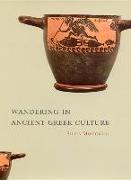- Start
- Wandering in Ancient Greek Culture
Wandering in Ancient Greek Culture
Angebote / Angebote:
From the Archaic period to the Greco-Roman age, the figure of the wanderer held great significance in ancient Greece. In the first comprehensive study devoted to this theme, "Wandering in Ancient Greek Culture "unearths the many meanings attached to this practice over the centuries. Employing a broad range of literary and philosophical texts, Silvia Montiglio demonstrates how wandering has been conceptualized from Homer's Odysseus--the hero "who wandered much"--in the eighth century BCE to pagan sages of the early Roman Empire. Attitudes toward wandering have evolved in accordance with cultural perspectives, causing some characterizations to persist while others have faded. The status of wanderers in Greek societies throughout history, for example, varied from outcasts and madmen to sages, who were recognized as mystical, even divine. The positive connotations of the activity became more prominent beginning with the fourth century BCE, owing especially to the Cynic philosophers. Examining the act of wandering through many lenses, "Wandering in Ancient Greek Culture" addresses questions such as: Why did the Greeks associate the figure of the wanderer with the condition of exile? How was the expansion of the world under Rome reflected in the connotations of wandering? Does a person learn by wandering, or is wandering a deviation from the truth? In the end, this matchless volume shows how the transformations that affected the figure of the wanderer coincided with new perceptions of the world and of travel, and invites us to consider its definition and import today.
Fremdlagertitel. Lieferzeit unbestimmt



